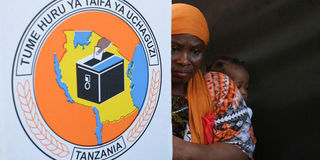How Tanzania's controversial vote led to nationwide curfews

A woman marks her ballot paper in a polling booth before casting her vote during the general election at a polling station in Dar es Salaam, Tanzania, October 29, 2025.
Tanzanian authorities instructed civil servants and students to stay home on Thursday, a day after a general election marred by violent protests that led police to impose a curfew in Dar es Salaam.
Protesters took to the streets in commercial capital Dar es Salaam and several other cities during the vote on Wednesday, infuriated by the exclusion of President Samia Suluhu Hassan's two biggest challengers from the presidential race, as well as what they say is deepening repression of government critics.
Protesters clashed with police, and a local government office was set on fire in Dar es Salaam. Internet service was disrupted across the country.
"All public servants in the country should work from home except those whose job duties require them to be present at their workplaces as directed by their employers," said a post shared on the Instagram account of government spokesperson Gerson Msigwa late on Wednesday.
The state television channel also announced that students should study from home on Thursday.
Msigwa did not respond to a phone call or text message seeking additional information.
The streets of Dar es Salaam were quiet early on Thursday as residents emerged from a curfew, with a heavy security presence patrolling the streets.
But on the Zello app, which allows a smartphone to function like a walkie-talkie, some protesters discussed plans for further demonstrations, including marches on government buildings.
Tanzania's main opposition party CHADEMA, had called for protests during the election, which it said amounted to a "coronation" of Hassan.
CHADEMA was disqualified in April from the election, which also included votes for members of parliament and officials for the semi-autonomous Zanzibar archipelago, after it refused to sign a code of conduct, and its leader, Tundu Lissu, was charged with treason.
The commission also disqualified the candidate for the opposition party ACT-Wazalendo, leaving only minor parties to take on Hassan.
Hassan, one of only two female heads of state in Africa, won plaudits after taking office in 2021 for easing the repression of political opponents and censorship that proliferated under her predecessor, John Magufuli.
In recent years, however, rights campaigners and opposition candidates have accused the government of unexplained abductions of its critics.
Hassan said last year she had ordered an investigation into reports of abductions. No official findings have been made public.
Follow our WhatsApp channel for breaking news updates and more stories like this.





